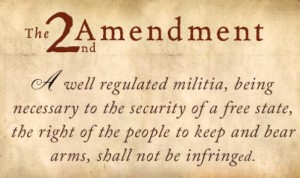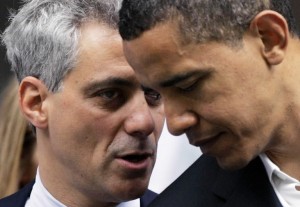Union vs. Constitution: Farewell to Apostate America, Part 4
In 1961, three months before Barack Obama’s birth, President John F. Kennedy gave a speech to members of the media. There is, said he, “little value in ensuring the survival of our nation if our traditions do not survive with it.”[1] Does JFK’s assertion apply today? In my judgment it is both pertinent and accurate, given that the nation is jettisoning its best traditions – like the sanctity of life, marriage, modesty, and allegiance to the Constitution.
The JFK quotation is more timely still in that 125,000 Texans, and another 330,000 in twelve States,[2] have petitioned the White House to let their States withdraw from the Union. Applying the biblical standard, “test everything; hold fast what is good,”[3] let us see how it applies to America’s continuance as one nation in the 21st century.
Sacred Scripture admonishes us not to negate inspired instructions. We are instructed not to quench the Spirit.[4] Insofar as the Framers of the Constitution were inspired men who built upon the foundation laid by the Founding Fathers — itself the product of divine favor (Annuit Coeptis) — then it follows that pious patriots ought to honor God’s bequest, and prioritize it over survival of the 50 State Union.
Put another way, if we are forced to choose between the Constitution and the postmodern version of America, it is our sacred duty to go with what Justice John Marshall deemed “the greatest improvement on political institutions — a written Constitution” [Marbury v. Madison 5 U.S. 137 (1803) at 178]. The written Constitution is preeminently precious regardless of the size or extent of the country over which it presides. It possessed priceless worth when we had 13 States, or 24, or 48.
In a malignantly betumored nation, however, the cancer can metastasize into our legal system and spread a blight that contaminates legal theory (see Professor Seidman below) and befouls the way the Constitution is interpreted. The crown jewels of Britain are more priceless than their residency in the Tower of London. Suppose some malodorous mold were to spread through the Tower and threaten to ruin the crown jewels. Surely the answer would not be tossing the jewels into the Thames River, but rather relocating them elsewhere than the Tower.
Likewise with America’s crowning glory, the Constitution. It looks like it may take secession to rescue from corruption what Gladstone called “the most wonderful work ever struck off at a given time by the brain and purpose of man.”[5] From my standpoint as a citizen whose ancestors supported the continental army in the New Jersey campaigns (1777-78),[6] I will stand with the written Constitution. If forced to choose between the venerable document and the American empire extending “from sea to shining sea,” then I would prefer that my grandchildren and their children see the survival of the written Constitution.
 Insofar as postmodernism is now superseding constitutionalism as well as Judeo-Christian traditions, it may soon become imperative that we apply Kennedy’s maxim and conclude that the Union has lost its value. We may have to reverse the discarding of our best traditions by means that include a downsized but upgraded new model of America. Within that revitalized framework, we will at least have a fighting chance to resist postmodern values; also to restore the old American value system that preceded the long series of secularizing decisions by the Judiciary since 1962/63.
Insofar as postmodernism is now superseding constitutionalism as well as Judeo-Christian traditions, it may soon become imperative that we apply Kennedy’s maxim and conclude that the Union has lost its value. We may have to reverse the discarding of our best traditions by means that include a downsized but upgraded new model of America. Within that revitalized framework, we will at least have a fighting chance to resist postmodern values; also to restore the old American value system that preceded the long series of secularizing decisions by the Judiciary since 1962/63.
Restoring what has served us well in the past stands in stark contrast to On Constitutional Disobedience (Oxford University Press, 2013), a book by Michael Seidman of Fordham University. This well-published constitutional law professor advocates exactly what its title indicates, namely disregarding the U.S. Constitution. The venerable document is outdated anyway, says Seidman. No longer should it hold us in thrall. Let King Constitution forfeit both crown and scepter.
American law schools are riven with professors who unapologetically oppose strict construction of the Constitution. Dr. Seidman takes this mindset to its logical conclusion. The Introduction to his book argues that the US Constitution should be read “as a work of art, designed to evoke a mood or emotion, rather than as a legal document commanding specific outcomes.”
We should give up on the pernicious myth
that we are bound in conscience to
obey the commands of people who
died several hundred years ago.
Seidman expresses a feeling typical of postmodernists, and reminiscent of the Jacobins during the French Revolution: “All the past was loathsome to them. All their agreeable associations were connected to the future.” (Macaulay) Seidman argues that in order to practice fidelity “to the great goals of the Constitution, we must first free ourselves from the yoke of constitutional obligation.” Whereupon, he continues, “‘We the People’ can begin the kind of open-ended and unfettered dialogue that is the hallmark of a free society.”
At least Professor Seidman is straightforward in spelling out his intent. Contrast his candor with Barack Obama, the ex-constitutional law prof., who undermines the Constitution with political slight of hand. [See brief by the Family Research Council citing eleven cases in point]. Among his stratagems for attacking the Constitution is to focus on its weakest points, like the lack of teeth in the 9th and 10th Amendments; also Article VI which does [or does not, depending on which Court decision you read(7)] put treaties on a par with our Constitution.
 Thus we are facing possible nullification of the 2nd Amendment if the Senate goes along with Obama’s push for the United Nations Small Arms Treaty. Obama’s strategy employs the jurisprudential principle that in a conflict between two laws of equal standing, the more recent law trumps the older — like the 21st Amendment overriding the 18th (Prohibition). Analogously, if a treaty agreement with the UN conflicts with the more than two centuries old 2nd Amendment (1789), then part two of the Bill of Rights will be superseded — in effect repealed — unless the Court takes up the case and overrules Obama and Harry Reid, et. al. How underhandedly clever!
Thus we are facing possible nullification of the 2nd Amendment if the Senate goes along with Obama’s push for the United Nations Small Arms Treaty. Obama’s strategy employs the jurisprudential principle that in a conflict between two laws of equal standing, the more recent law trumps the older — like the 21st Amendment overriding the 18th (Prohibition). Analogously, if a treaty agreement with the UN conflicts with the more than two centuries old 2nd Amendment (1789), then part two of the Bill of Rights will be superseded — in effect repealed — unless the Court takes up the case and overrules Obama and Harry Reid, et. al. How underhandedly clever!
One of the advantages of forming a new model America via secession would be to release us from the chains of earlier treaty obligations. Not only would dissolution of the Union free us to reassess all international treaties and protocols, but the process of secession would give us a golden opportunity to ratify one arch-Amendment, including a specific provision annulling any and all treaty obligations that conflict with the Constitution. By means of partition we can also break the bonds of postmodern Court rulings that ensnare us domestically. During the last half-century, the Federal Courts have inflicted a “long train of abuses and usurpations,” the criteria referred to in the Declaration of Independence as justification for the original American Revolution.[8]
Under Article III, sec. 2, the Congress has constitutional authority to override usurpatory judicial rulings by removing court jurisdiction. But the hopelessly polarized condition of the Congress, and indeed of the country itself, makes this tactically impossible today. Whereas the Congress of our new model America would present a totally different situation politically; and in conjunction with reforms like congressional rotation in office, our citizens might look with realistic hope for decisiveness by the revitalized Legislative Branch.
 To break up the Union would be worthwhile also for the general reason that the USA’s polity, economy and collective culture constitute rancid soil in which to plant the salutary reforms that can alone drain the foul and fetid flood that immerses the nation. In the hinterland of America we still have plenty of high and healthy ground, as indicated partly by the fact that in 2012 more than 3/4 of the nation’s counties voted against a 2nd term for Barak Obama’s regime, and even in the three blue States that sanctioned same-sex-marriage (Maine, Maryland, and Washington) the majority of counties voted nay.
To break up the Union would be worthwhile also for the general reason that the USA’s polity, economy and collective culture constitute rancid soil in which to plant the salutary reforms that can alone drain the foul and fetid flood that immerses the nation. In the hinterland of America we still have plenty of high and healthy ground, as indicated partly by the fact that in 2012 more than 3/4 of the nation’s counties voted against a 2nd term for Barak Obama’s regime, and even in the three blue States that sanctioned same-sex-marriage (Maine, Maryland, and Washington) the majority of counties voted nay.
The trends toward paganism in the industrialized world suggest that a new model union of the still healthy red States would eventually yield to the same spreading infection with which the blue States are afflicted; in the absence, that is, of a program of immunization. Unless the contagion can be checked we would reap no long-term result to justify the expenditure of effort, and perhaps blood, to accomplish secession. Lest all our efforts go for naught, it is imperative that new guards in the form of one arch-Amendment be part of the process of forming the new Union; lest like the old one, it too should absorb the most sordid forms of sleaze, corruption, and sin.
As per JFK’s maxim, then, we must take our venerable traditions with us, and safeguard their survival, assuring that the newly formed nation retains its value.
Endnotes
[1]JFK, 4/27/1961 speech to American Newspaper Publishers Association, Waldorf-Astoria Hotel, New York, NY.
[2] The States which exceeded 30,000 signatures before the deadline are: Texas, 125,746; Louisiana, 38,991; Florida, 36,859; Georgia, 33,695; Tennessee, 32,600; North Carolina, 31,759; Alabama, 31,522.
States exceeding 20,000 signatures: S. Carolina 26,028; Arizona, 23,509; Arkansas, 23,158; Colorado, 22,304; Indiana, 21,594; Missouri, 20,257.
[3] 1 Thessalonians 5:21
[4] Ibid, 5:20-21. “Do not quench the Spirit; do not despise prophesies.” I take inspired instructions, even in the secular realm, as equivalent to prophesy. In that sense the written Constitution may be seen as a prophetic document.
[5] William Gladstone, “Kin Beyond Sea,” 127 North American Review (1878) 179, 185. Quoted by Charles L. Black, Jr., “The Year of Pride and Praise,” Boston Law Review 67 (1987):783.
[6] Daniel Struble served under Gen. Washington at Morristown, 1778, and his father, Dietrich Struble [my distant great-grandfather], has been recognized by the Daughters of the American Republic for material service in support of the American Revolution.
[7] For varying interpretations of the Supremacy Clause in Article VI, see Justice Oliver Wendell Holmes’ decision in Missouri v. Holland (1920) vis-a-vis Justice Hugo Black’s in Reid v. Covert (1957); also the pending case of Bond v. U.S.
[8] A partial list of usurpatory judicial rulings since 1962/63: Secularization of the public schools and of public life. Overturning pro-life laws in all 50 states. Opening the floodgates to pornography. Restructuring state government, and requiring reapportionment, so that counties no longer serve as the basis for representation in the upper house of state legislatures (Baker v. Carr). Overturning the people’s will on term-limits reforms, as decisively expressed at the polls. Overturning the line item veto, that allowed the President to eliminate particulars in tax and spending measures. Curtailing the right to trial by jury for citizens threatened with jail for less than six months. Empowering government to confiscate private property, including the family home, and give it over to private developers. Redefining congressional declarations of war to include “force resolutions.” Overturning the people’s will, as expressed in statewide referendums, against special rights for homosexuals. Inserting sodomy into the Constitution as a “full right,” (Lawrence v. Texas, 2003) thus sullying the Bill of Rights. Debasing the Constitution: converting it from the epitome of order and balance, to a formula for disorder and dissonance, and for rule by usurpers in black robes rather than governance by elected representatives of the people.
For earlier parts of this series, follow these links:
“Farewell to Apostate America,” Tentative Exit Plan
Farewell to Apostate America, part 2
Poem: Farewell to Apostate America
Obama on Secession: Farewell to Apostate America, part 3




